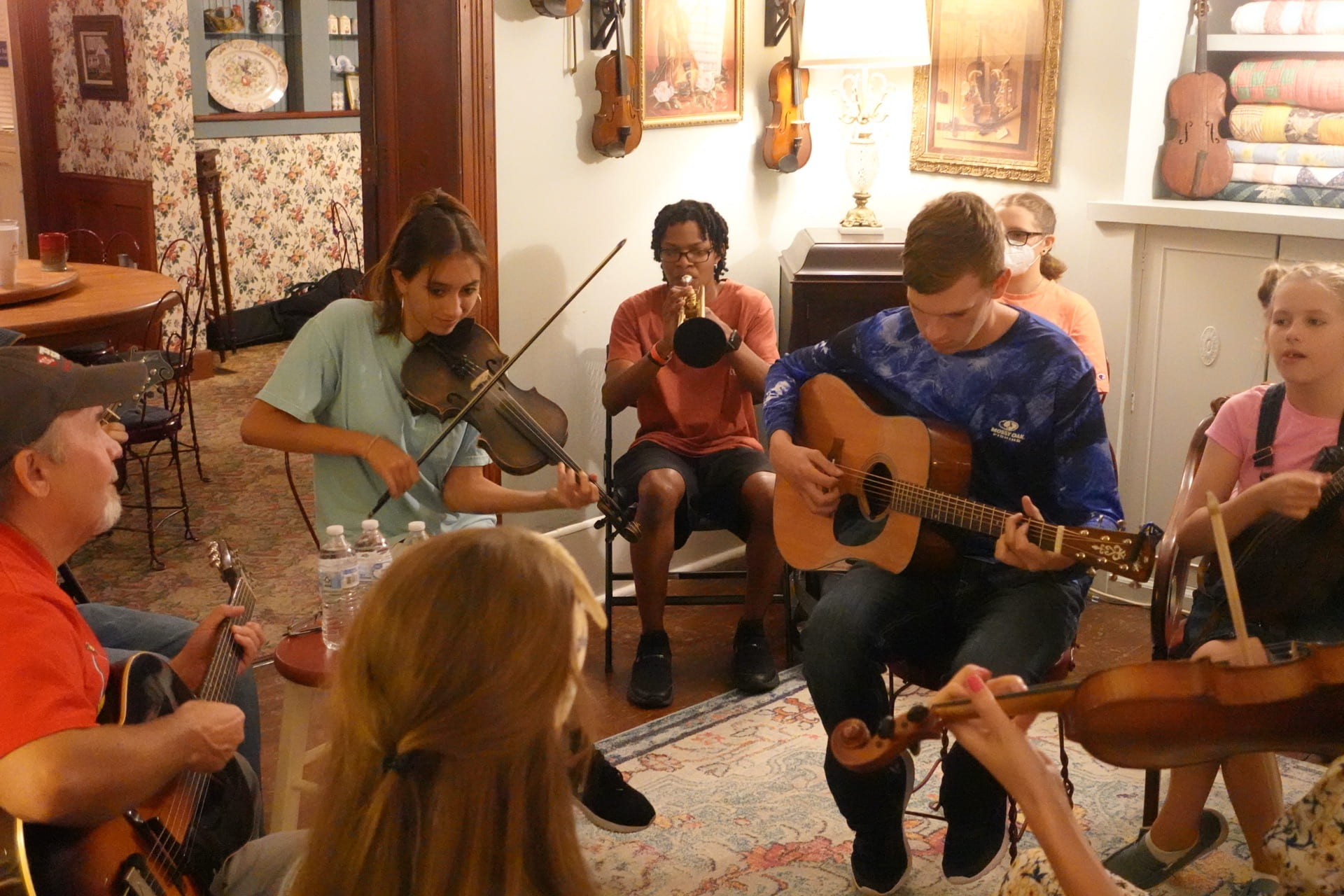Terrell Page is a fourth-year Honors College Fellow studying English education. Originally from Magnolia, Arkansas, in the southern part of the state, Terrell participated in the Ozark Bootcamp forum where students immersed themselves in Ozark culture and history. Through the program’s field trip to Mountain View, he found an opportunity to understand the region better through its vibrant tradition of folk music, which he connected to his experience of Black gospel songs back home.
Why I took this Class
Ok, I’m not from the Ozarks. And although I’m from Arkansas, I might leave after graduation. I’ve wanted to explore the rest of the world ever since I first learned that anything existed outside of the state. But I have this friend who lives so close to the Ozarks that she occasionally sends me beautiful sunset pics of the river near her farm in the hills and swears that she never wants to fully leave Arkansas. I used to think she was just crazy, but then I found that many of my peers (and even my textbooks!) also consider northwest Arkansas (NWA) and the Ozarks “small-town America”. All this bewildered me, since my home looks and sounds very different.
On my way to the University of Arkansas, my grandparents, uncles and aunts gave me a shorter version of the lectures I’ve gotten in this class. They told me that I’d love the scenery and the volunteer opportunities. They also told me that they knew NWA wasn’t very diverse, but they believed that I wouldn’t have that much trouble navigating it. “It really is a different world up there,” they mused, “you’ll enjoy it, though.” When I arrived in Fayetteville, some upperclassmen friends gave me the same speech, but they also explained how NWA’s history as a hub of sundown towns is partly to blame for the region’s lack of diversity. “Now, though,” they explained, “its bigger companies are trying to reverse that by hiring more people of color, but even that hasn’t persuaded many African Americans to move here.”
Okaaaaaay. Definitely “a different world.”
But since my sunset-basking friend is verifiably sane, I took Ozark Bootcamp to try to understand her point of view before leaving. I know that the Ozarks consider me an outsider, an Other, or whatever, but to me the Ozarks are the Other. So, it was nice to be able to explore it in a study abroad-like experience. And since music is how I learn about various cultures, I was especially excited to learn about and play along with the region’s folk music in Mountain View! Though I brought a different style of music to the group, I didn’t feel like such an outsider when we were all playing together. It certainly wasn’t home, but at least I didn’t feel so alone. In that moment, I really felt like the only outsiders were those without an instrument!
What I Learned
A big part of Ozark folk music is instrumental music known as Old-Time, played by a fiddle, an acoustic guitar and an upright bass. Most upbeat Old-Time songs are played for square dances while others are more waltz-like for slow dances and background music. Since jazz improvisation isn’t common in Old-Time, everyone was surprised when I pulled out my trumpet to play along, but I had planned this ever since I saw that a jam session was scheduled on the itinerary.
Prior to this trip, I had been exposed to some folk and bluegrass music through video games like in “Humoresque of a Little Dog” from Super Smash Bros. Ultimate. I’d even heard folk merged with jazz and metal, and some of my favorite musicians have recently been diving into both French-Canadian and Korean folk music to inform their craft. Of course, none of this was exactly like real Old-Time Ozark music, but it provided a nice introduction. And the concept of a newcomer visiting and playing a strange instrument alongside more traditional folk instruments isn’t new to me either. I’ve played video games with this thematic concept in them since I was little!
As I learned more about folk music during our stay in Mountain View, I began to compare it not just to video game music but also to Black gospel music. Black gospel music is typically played on a piano, a drum set and a guitar (both electric and bass), but wind instruments like trumpets and saxophones are rare. Its congregational songs (led via call-and-response) are much easier to sing than to play, since even their first few seconds can be rife with challenge for the musicians: the pianist must guess what musical key the singer is in, the drummer must enter with the right tempo and every other instrument must fend for itself. The non-congregational songs (ranging from the 1980s to the present) that we sung at my home church were officially published, but many of them were learned by ear and passed along from church to church, leading to various interpretations. All this came to my mind when our hosts in Mountain View creatively played “Old Danger Field” with a Michael Jackson bassline.
Just like how Old-Time fiddlers must memorize hundreds of songs, I had to memorize the instrumental and choral parts of dozens of non-congregational songs. The guitarists of Old-Time usually comp, or play chord progressions, to the fiddle’s melody. I did the same thing (but only on arpeggios) in church whenever I encountered a new song and didn’t know the melody. In Old-Time, the musicians’ leader kicks their foot out to signal to the others to end on the next possible stopping point, much like when a Black gospel choir director holds up a fist to signal the same to the choir and musicians. And though all instruments play simultaneously in Old-Time, they each get a solo in bluegrass.
I loved learning and discussing these similarities with the musicians in Mountain View. It was as if we spoke different dialects of the same wonderful language—music!

